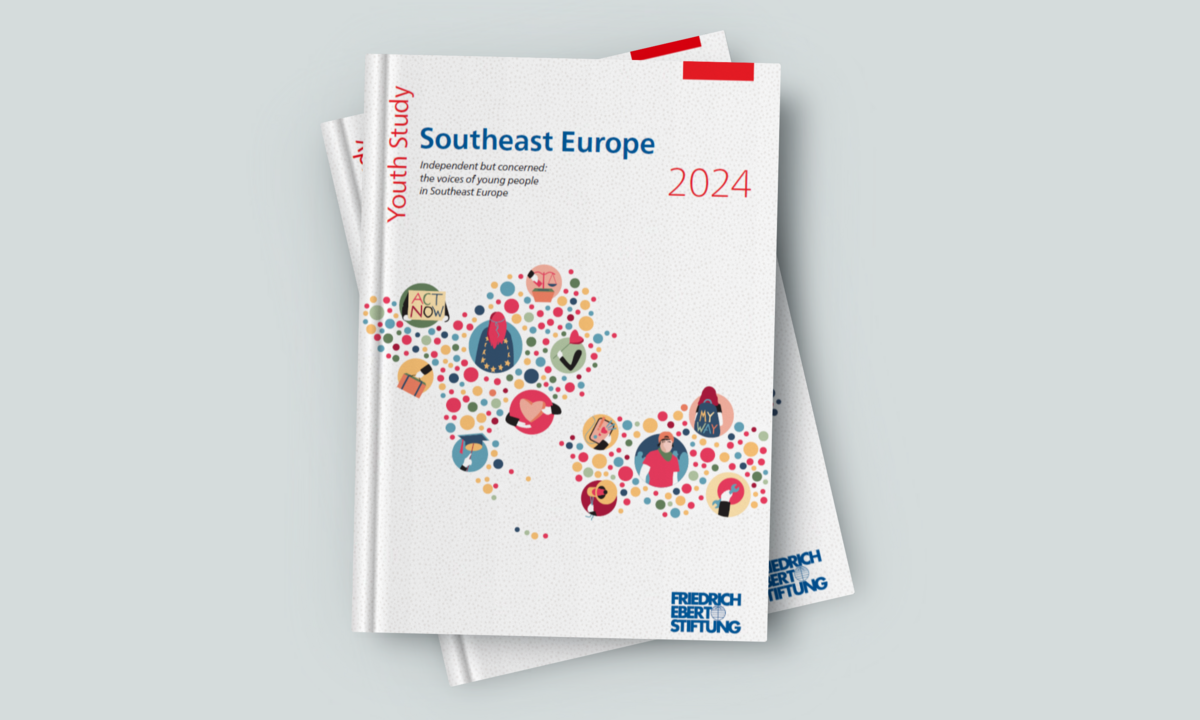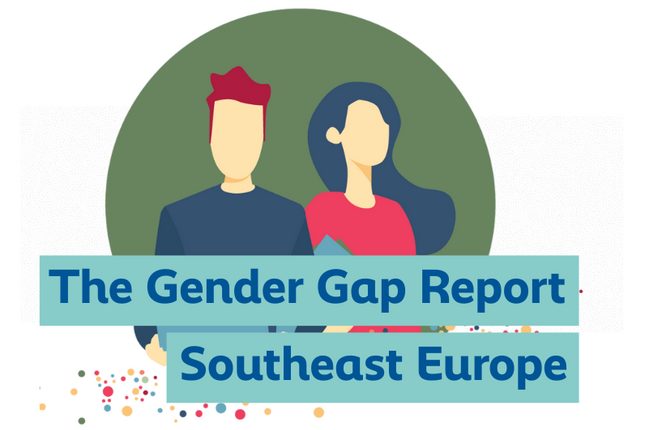
The Gender Gap Report Part III: Türkiye's Partisan Capture of Gender Policy
When International Agreements Become Domestic Battlegrounds
In July 2021, Türkiye became the first and only country to withdraw from the Istanbul Convention—a landmark international treaty on preventing violence against women that Türkiye itself had been the first to ratify almost a decade earlier. Three years later, the Friedrich Ebert Foundation's 2024 Youth Study reveals that this decision reflects not a fundamental gender divide among young people in Türkiye, but rather how partisan identity increasingly shapes views on gender policy.
This is the third installment in our analysis of Southeast European youth attitudes. While previous reports examined regional patterns, this time we look specifically at how Türkiye's case illustrates ways in which political polarization can influence policy debates, with partisan identity playing a significant role in how young people view international agreements on gender issues
The data reveals a generation where partisan identity has become the primary lens through which young people view gender policy. Political alignment creates gaps of 20+ percentage points between government and opposition supporters, while gender differences within each political camp remain modest—typically 3-7 points. The data tells a story of a generation divided not by gender, but by political and religious fault lines.
The Numbers: Partisan Identity Trumps Gender Identity
Young people in Türkiye are evenly split on the Istanbul Convention withdrawal, but this apparent balance masks profound political sorting. Overall, 25% support withdrawal while 47% prefer staying in the convention. With virtually no gender gap overall, the real story emerges when viewed through political alignment.
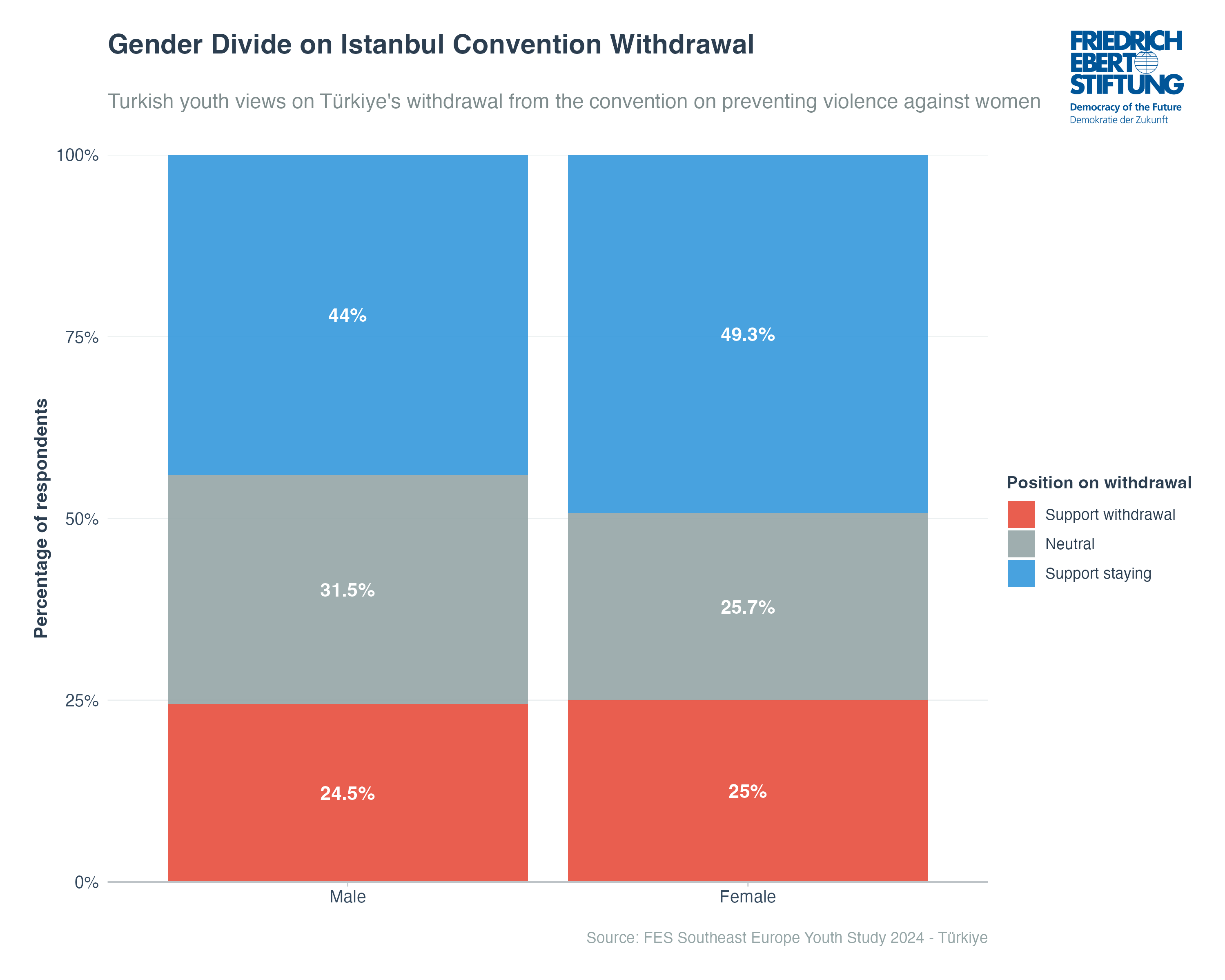
Among government supporters, 37% of men and 44% of women back withdrawal—a 7-point gender gap. Among opposition voters, only 21% of men and 17% of women support withdrawal—a 4-point gap in the opposite direction. The political divide is more than three times larger than even the largest within-group gender divide: on average, 41% of government supporters favor withdrawal compared to 19% of opposition supporters, a 22-percentage-point political gap that dwarfs gender differences.
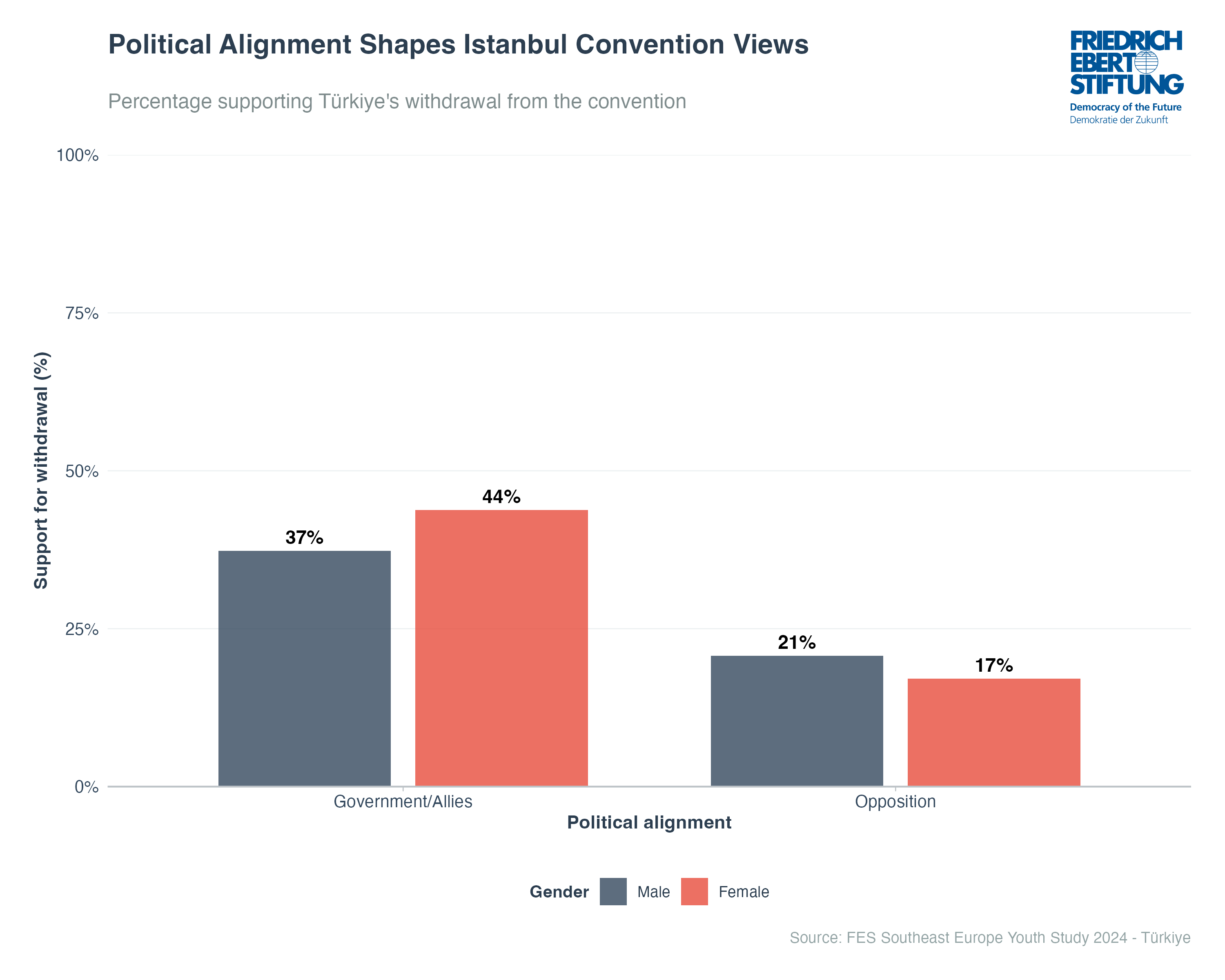
Violence Prevention: Women Favor All Approaches More
When asked about preventing violence against women, young people in Türkiye show consistent gender gaps across all approaches, with women expressing higher support for every method. Harsh punishments top the list—70% of women and 58% of men support tougher sentences, reflecting the most popular approach regardless of gender.
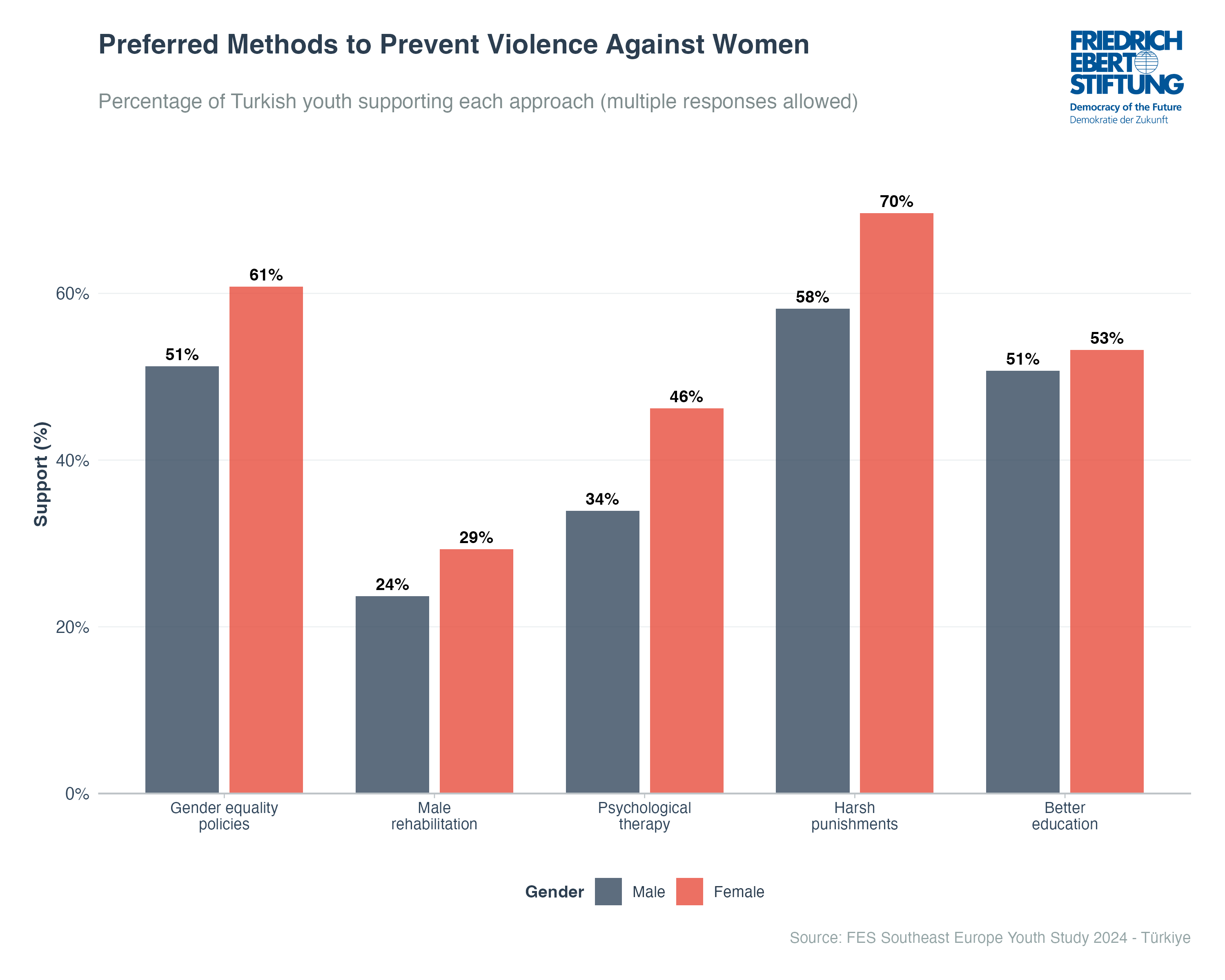
Beyond these gender patterns, political identity shapes preferences unevenly. Among the approaches shown, support for gender equality policies shows the starkest political divide—71% of those wanting to stay in the Istanbul Convention support equality measures versus 45% of withdrawal supporters. Yet this political sorting does not extend to other approaches, where Istanbul Convention attitudes show weak or no correlation with preferences.
The modest support for male rehabilitation programs (24% men, 29% women) reveals widespread skepticism about perpetrator change across all political and gender groups. This suggests that regardless of other disagreements, young people in Türkiye share doubts about whether violent behavior can be meaningfully altered through intervention programs.
Politics Set the Stage, Religion Fills the Details
Religious participation increases support for Istanbul Convention withdrawal, but the effect varies by political alignment. Among all young people in Türkiye, withdrawal support rises from around 20% among the least religious to over 40% among the most religious, but this overall pattern masks sharp political differences.
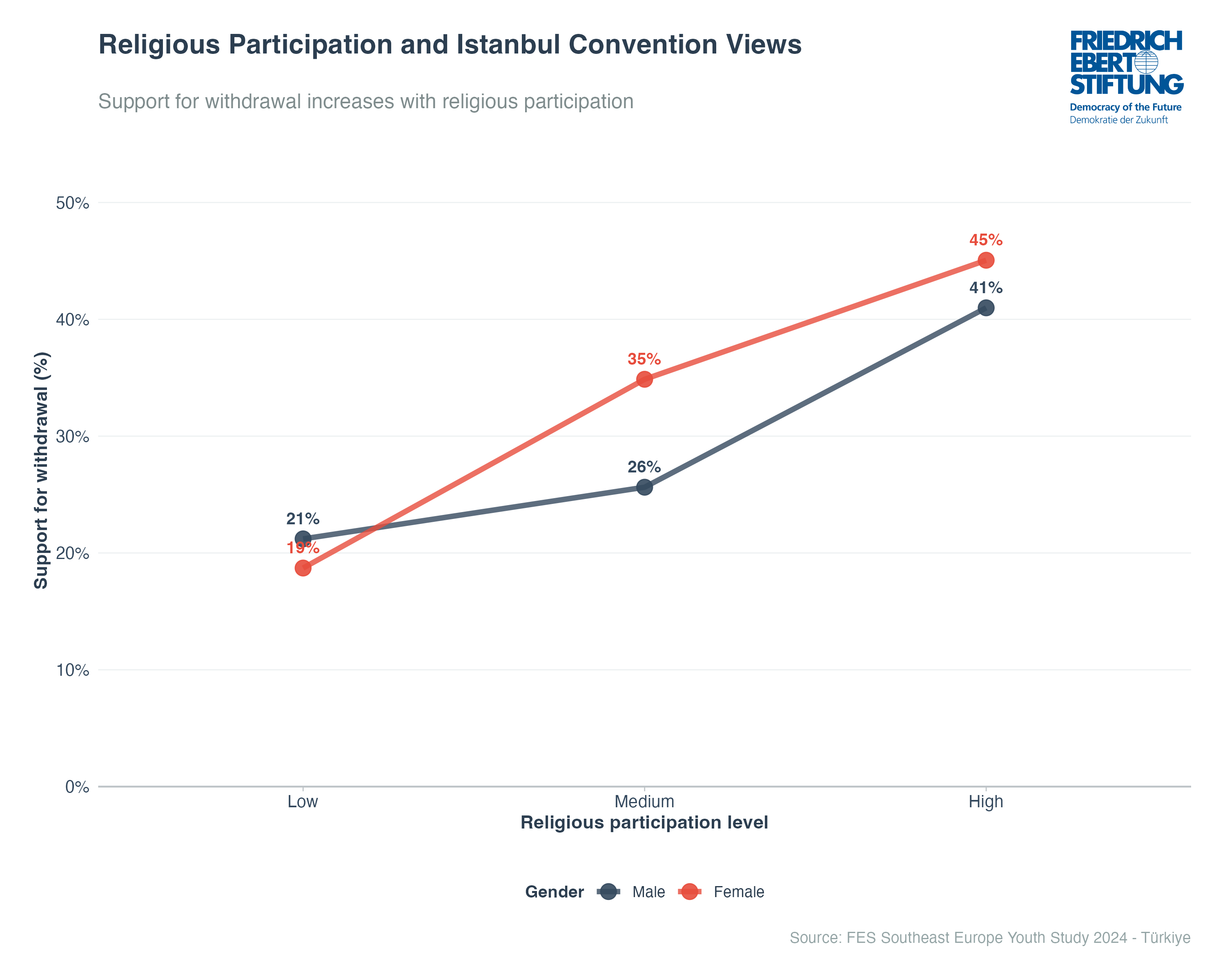
Political identity determines how much religion matters for gender policy attitudes. Among government supporters, religiosity creates a steep gradient—withdrawal support jumps from 32% among secular youth to 55% among the highly religious, a 71% relative increase. Among opposition supporters, religiosity has a more modest but still meaningful impact—support rises from 18% to 26%, a 44% relative increase.
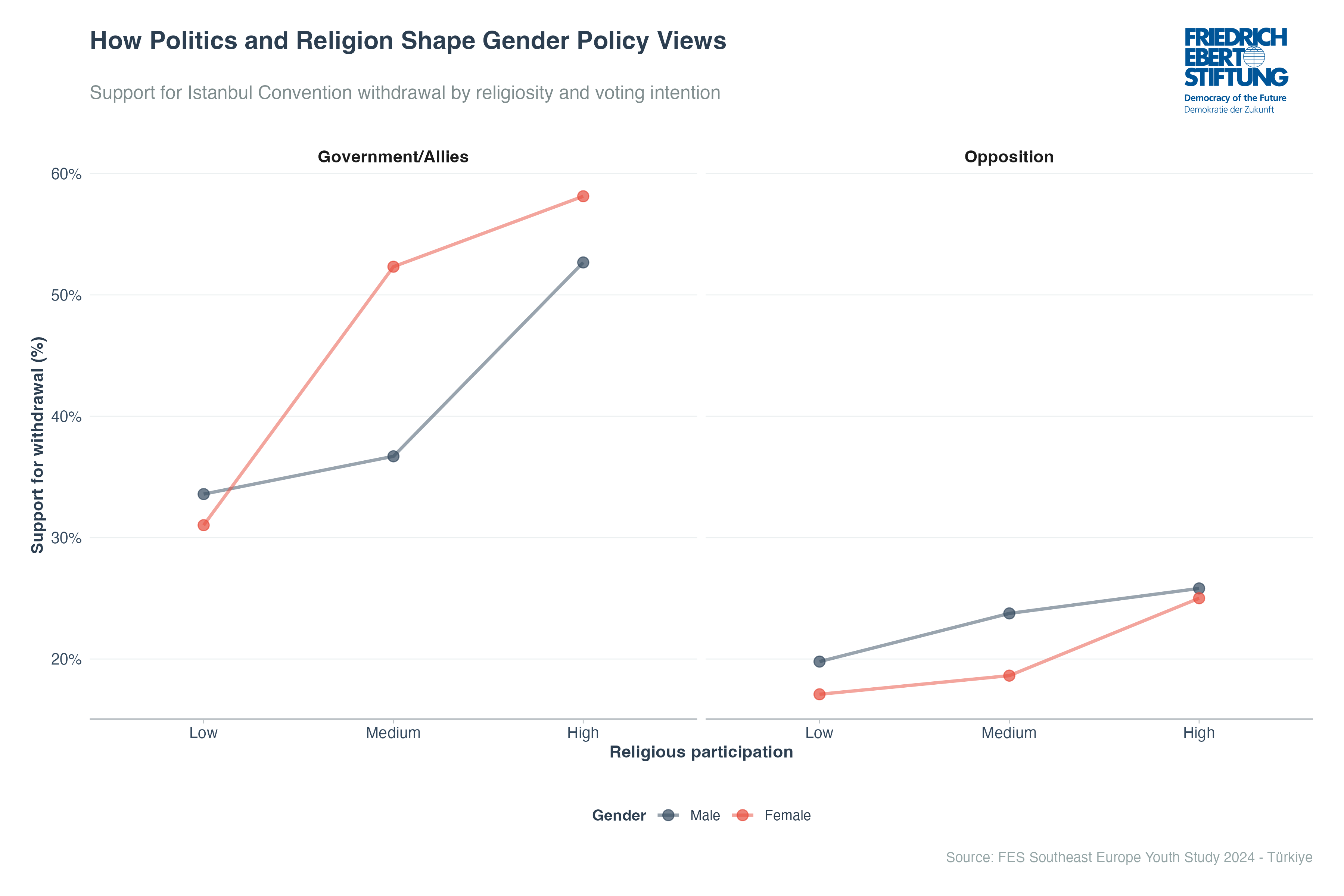
This pattern reveals that political identity sets the baseline for gender attitudes while determining religion's influence. Opposition identification appears to limit the effect of religious conservatism, keeping withdrawal support below 26% even among highly religious youth. Government support, by contrast, allows religious identity to exert its full influence, pushing withdrawal support above 55% among religious supporters.
The different patterns across political alignments reveal the relationship between religious participation and policy attitudes. Among government supporters, those with higher religious participation show substantially higher support for withdrawal. Among opposition supporters, religious participation shows a more modest association with withdrawal support, though the relationship remains present.
The Ideological Package Deal
Istanbul Convention attitudes form part of coherent ideological packages about gender and power. The graph reveals stark differences between those supporting withdrawal versus staying across multiple gender attitudes. Among those supporting withdrawal, 71% of men and 69% of women believe "women already have sufficient rights," compared to just 35% of men and 30% of women among those wanting to stay in the convention.
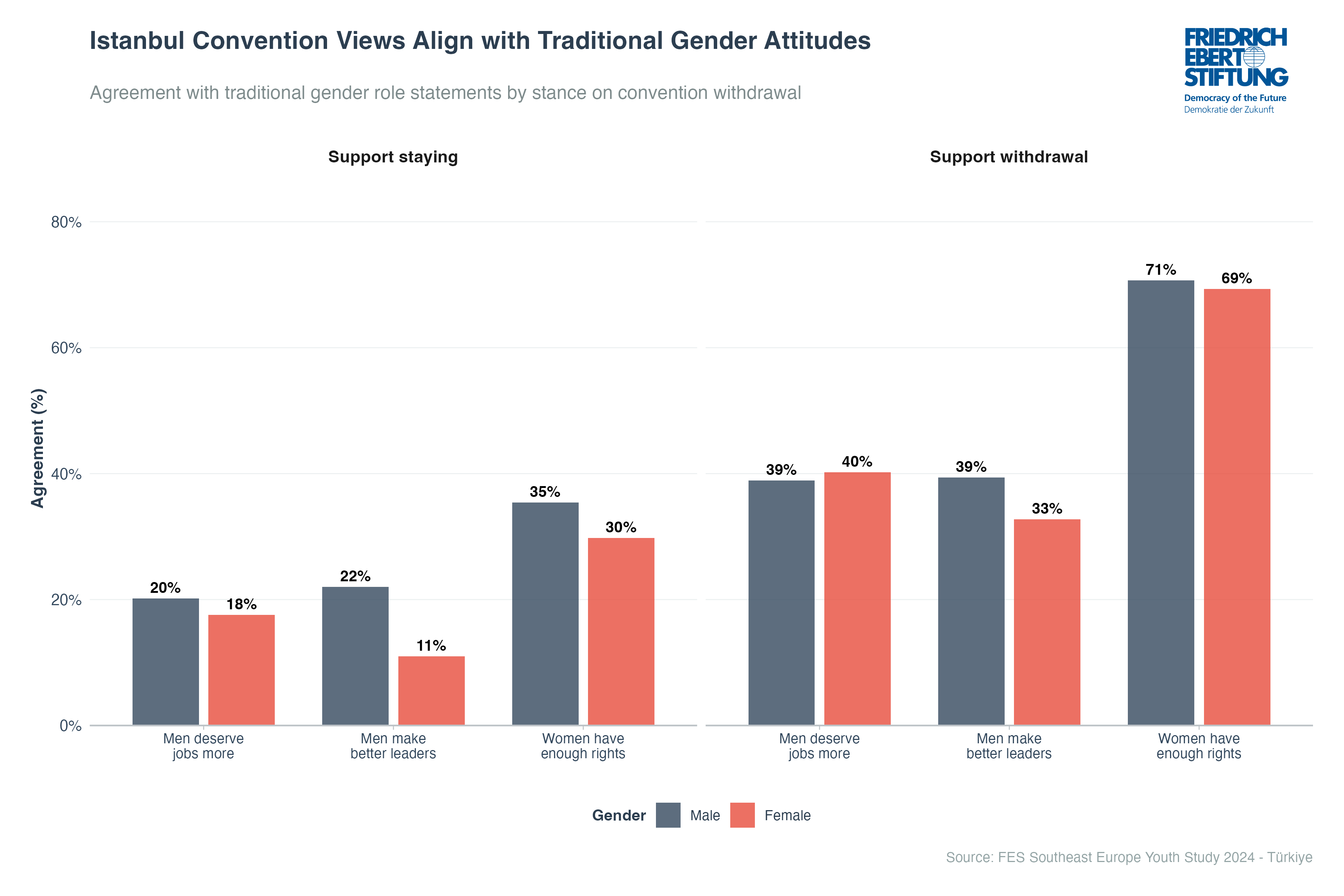
Similar patterns emerge across other attitudes. On male political leadership, 39% of men and 33% of women supporting withdrawal agree that "men make better political leaders," compared to 22% of men and 11% of women supporting staying. For employment priorities, around 40% of both men and women supporting withdrawal believe "men deserve jobs more when work is scarce," versus roughly 20% among those supporting staying.
These consistent differences across multiple attitudes indicate that Istanbul Convention positions are part of broader ideological packages about gender roles and power, with the Convention itself embodying particular assumptions about gender, authority, and social organization.
Demographics Matter Less Than Politics and Religion
Traditional demographic divides prove surprisingly weak in shaping Istanbul Convention attitudes. Urban-rural differences are minimal—only 2.7 percentage points overall—and inconsistent across age groups. In some age cohorts, rural youth actually show lower withdrawal support than their urban counterparts. Age patterns show no linear relationship whatsoever, with correlation near zero, suggesting these attitudes crystallize early and remain stable through young adulthood.
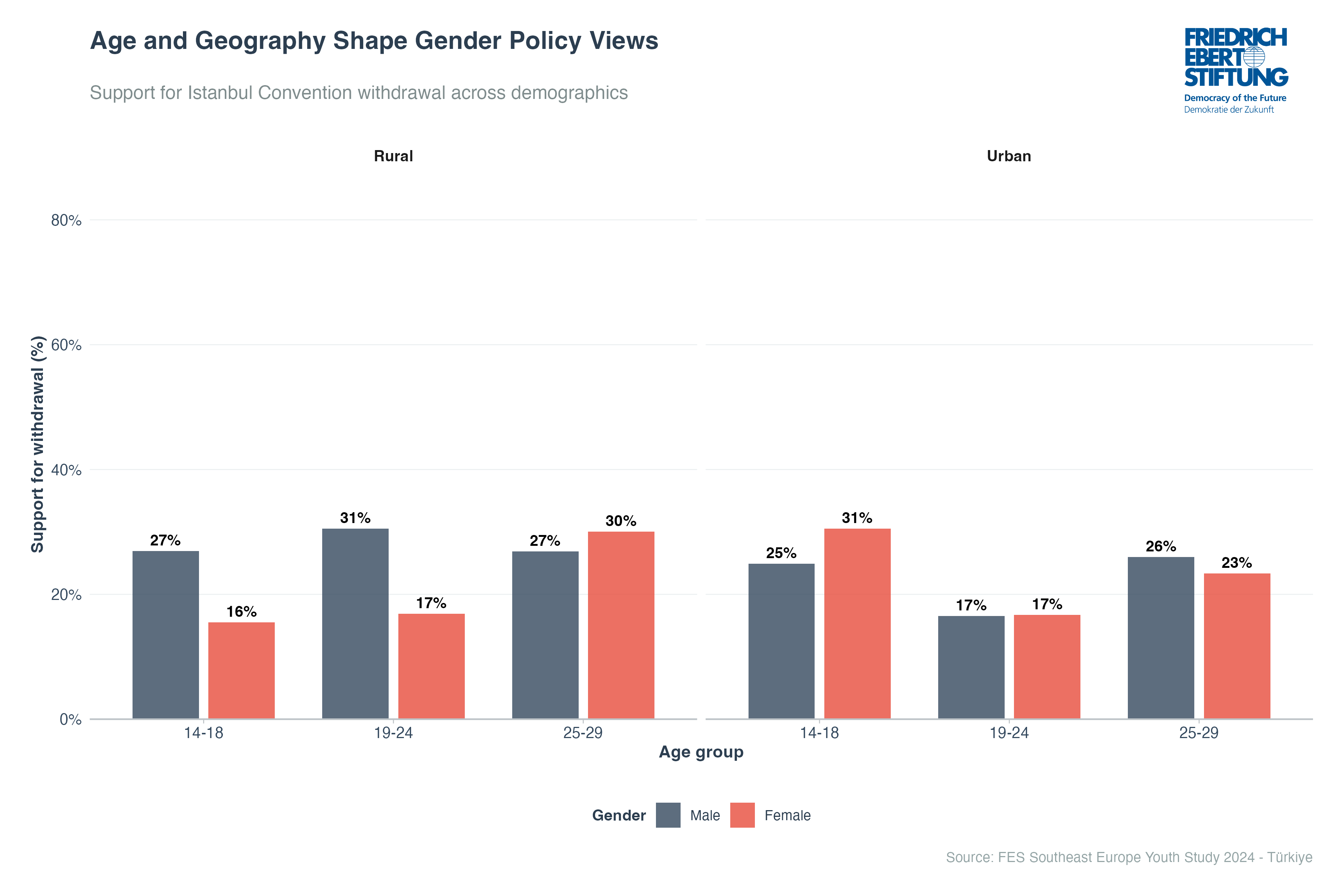
The weakness of demographic effects becomes stark when compared to political and religious identity. While rural-urban differences amount to less than 3 percentage points, political alignment creates 21-point gaps and religious participation generates 23-point differences across the general population. This challenges geographic determinism in social attitudes—urban residence does not automatically produce progressive gender views, nor does rural life necessarily entrench traditional ones.
Instead, political and religious identities—which transcend geographic boundaries in the digital age—prove 8 times more powerful in shaping gender policy attitudes. Views on international agreements among young people in Türkiye appear driven primarily by ideological alignment rather than their physical location or life stage, suggesting that information environments and identity communities matter more than traditional demographic categories.
Political Sorting on Gender Policy
The Istanbul Convention debate in Türkiye illustrates how political alignment can influence young people's views on international agreements. Our data shows that partisan identity plays a significant role in shaping attitudes toward gender policy, with political alignment creating larger gaps than gender itself.
Young people in Türkiye do not view the Istanbul Convention in isolation. Instead, their positions align with broader patterns of political and ideological identification. This suggests that international agreements become integrated into existing political frameworks rather than evaluated solely on their specific policy merits.
These findings highlight the complexity facing advocates of violence prevention policies. When international frameworks become integrated into existing political cleavages rather than being evaluated primarily on their practical merits, implementation faces additional hurdles beyond technical or resource constraints. The challenge lies in navigating policy discussions where positions are shaped by broader political identities rather than specific policy content alone.
Implications
For Turkish Democracy: These gender policy debates will shape not just laws but the character of democratic discourse itself. Whether Türkiye can develop frameworks for deliberating contested issues without complete partisan sorting may determine the health of its democratic institutions.
For Youth Development: Young people in Türkiye increasingly sort into distinct ideological frameworks that shape their views on gender, authority, and international agreements. Whether future generations can bridge these different worldviews—or whether political sorting will deepen—depends partly on political, educational and social institutions' ability to create spaces for cross-cutting dialogue.
Conclusion
Türkiye's Istanbul Convention debate is not fundamentally about gender—it is about the health of democratic deliberation when political identity shapes policy views. The modest gender gaps masked by political chasms reveal how partisan identity has captured domains that should remain open to evidence-based debate.
For Türkiye's youth, these patterns suggest not inevitable trajectories but choices about how to organize political life. The decisions they make about bridging or deepening these divides will determine not just the future of gender equality but the character of Turkish democracy itself. Their challenge is learning to disagree about means while preserving shared commitments to human dignity and violence prevention—the foundation of democratic governance in diverse societies.
The Istanbul Convention withdrawal may have ended Türkiye's formal commitment to international gender frameworks, but the real struggle is over whether Türkiye can develop domestic capacities for reasoned debate about contested issues. That outcome remains undetermined, shaped by choices young people in Türkiye make about political engagement, cross-cutting dialogue, and democratic citizenship.
About the Data
This analysis draws from the Friedrich Ebert Foundation's Southeast Europe Youth Study 2024, examining attitudes among 1,233 young people aged 14-29 in Türkiye. The survey included specific questions about Istanbul Convention withdrawal and violence prevention methods, providing unique insights into gender policy attitudes among young people in Türkiye.
Related publication
Hasanović, Jasmin ; Lavrič, Miran ; Adilović, Emina ; Stanojević, Dragan
Youth study Southeast Europe 2024
independent but concerned: the voices of young people in Southeast Europe

